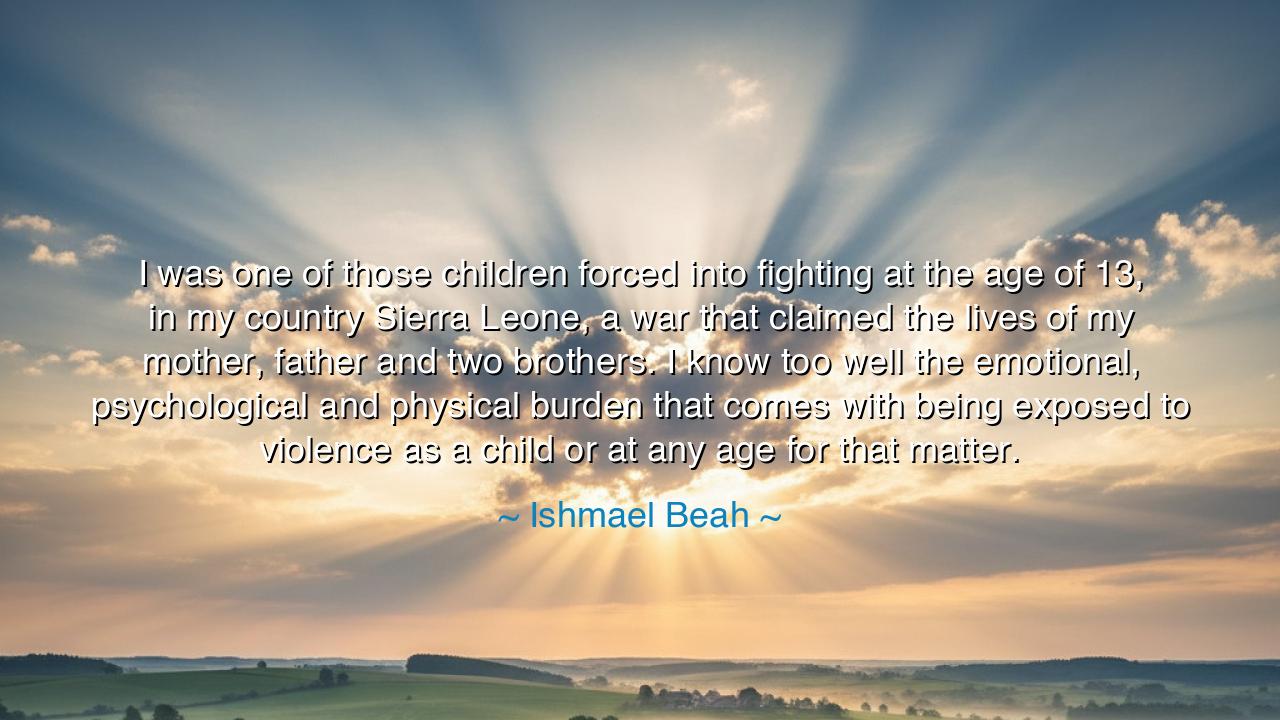
I was one of those children forced into fighting at the age of
I was one of those children forced into fighting at the age of 13, in my country Sierra Leone, a war that claimed the lives of my mother, father and two brothers. I know too well the emotional, psychological and physical burden that comes with being exposed to violence as a child or at any age for that matter.






The words of Ishmael Beah—“I was one of those children forced into fighting at the age of 13, in my country Sierra Leone, a war that claimed the lives of my mother, father and two brothers. I know too well the emotional, psychological and physical burden that comes with being exposed to violence as a child or at any age for that matter.”—are not merely the recollections of a survivor. They are a testament carved in pain and resilience, a cry rising from the ashes of innocence lost. His voice carries the weight of generations of children who have been made to bear arms instead of dreams, whose laughter was silenced by the drumbeat of war. In these words lies both a personal truth and a universal warning: that when a child’s soul is exposed to violence, the wound does not end with the war—it ripples through time, through hearts, through nations.
Beah’s story, told in his memoir A Long Way Gone, emerges from the brutal civil war that ravaged Sierra Leone in the 1990s, a conflict that turned fields of childhood into battlefields of despair. At the age when a child should be learning the music of the world, he was taught the rhythm of gunfire. Torn from family, stripped of safety, and thrust into the machinery of war, Beah became both victim and instrument of violence. Yet within his suffering, he discovered a deeper truth—that even when the body is enslaved by war, the spirit may still one day awaken to peace. His quote is the voice of that awakening, the reflection of a man who remembers darkness so that others might choose light.
The burden of violence, as Beah speaks of it, is not only the memory of what was done, but what it makes of the soul. The emotional wound is the first—fear that never fully fades, the loss of trust in the world’s goodness. Then comes the psychological scar, the reshaping of thought and perception, as innocence gives way to vigilance, joy to guilt, hope to numbness. Finally, there is the physical toll—the sleepless nights, the trembling hands, the ache in the bones where trauma once lived. These are not wounds that fade with time, but inscriptions written deep within the human being. Beah’s words remind us that every act of violence echoes beyond its moment—it breeds new pain, new cycles, unless the world learns to listen and to heal.
History offers countless mirrors to Beah’s story. In the ruins of ancient Sparta, boys were taken from their mothers at seven to be trained as warriors—children molded into soldiers long before they understood life’s worth. They were taught to kill before they learned to question, to suppress compassion in the name of strength. The Spartans glorified endurance, yet they forgot that true power lies not in conquest, but in humanity. So too did Beah’s captors believe they were creating fighters, but what they were truly doing was wounding the future—for when children are robbed of their childhood, a nation loses its tomorrow.
Yet in Beah’s story lies not only tragedy, but redemption. For he did not remain in darkness. Through compassion, education, and the steady work of healing, he reclaimed the voice that war had tried to silence. He transformed his pain into purpose, his trauma into testimony. He became a messenger for peace, an advocate for children who still wander the world’s conflict zones unseen. In this, his story mirrors that of the phoenix—the mythic bird that rises reborn from its own ashes. The fire that destroyed his childhood became the flame that lights his path toward meaning. And through his voice, he offers the same light to others who have suffered.
The deeper meaning of Beah’s words extends to us all, for violence is not always waged with guns. There are forms of cruelty—neglect, hatred, indifference—that scar the heart in quieter ways. To be human is to carry pain, but to be wise is to transform that pain into understanding. Beah teaches that empathy is not weakness—it is survival. His reflection invites us to listen to the stories of those who have suffered, to let their pain awaken compassion rather than apathy. For when we close our eyes to the suffering of others, we become architects of the very world we fear.
So let this be the lesson carried forward: protect the innocence of the young, for they are the hope of the earth. Guard them not only from the weapons of war, but from the poison of hatred, from the apathy that allows violence to grow. If you are a parent, nurture gentleness. If you are a leader, defend childhood. If you are simply human, choose kindness over cruelty, dialogue over destruction. Beah’s story is proof that the smallest act of care—a helping hand, a listening ear, an open heart—can begin to heal even the deepest wound.
And remember this: what was taken by violence can still be redeemed by love. Ishmael Beah’s journey from child soldier to peacemaker is the story of human resilience itself—the reminder that even in the heart of darkness, the light of human spirit endures. It is a call to all generations: that we, who are capable of destruction, must also be capable of repair. And that the greatest victory, as Beah teaches through the echo of his pain, is not won on the battlefield, but in the human heart that refuses to surrender its compassion.






AAdministratorAdministrator
Welcome, honored guests. Please leave a comment, we will respond soon